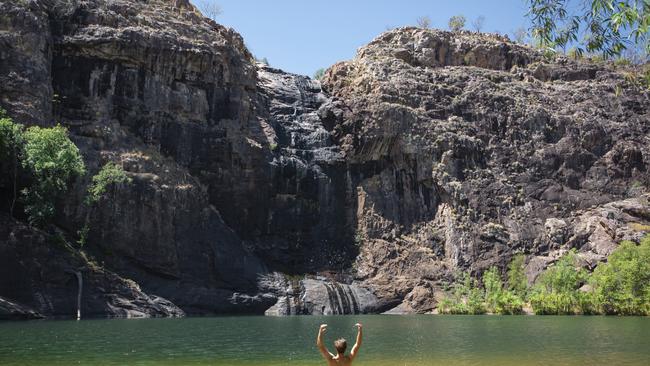Kakadu sacred site damage sparks legal tussle
The federal government is using obscure constitutional provisions to plead not guilty to sacred site damage in a case in which it admits to wrongdoing.

The federal government is using obscure constitutional provisions to plead not guilty to sacred site damage in a case in which it admits to wrongdoing.
The strange story involving one of Kakadu’s best-known tourist spots has angered local Aboriginal groups and could affect how governments manage Indigenous heritage on federal land.
Gunlom Falls is a staple of Top End tourist brochures. Hidden deep in the Mary River region, it offers visitors the chance to bathe in a crystal-clear natural infinity pool atop an 85m-high waterfall. The area around Gunlom was the setting for key scenes in the movie High Ground, about frontier conflicts and colonial overreach.
Gunlom visitors scrambled single file up a narrow, rock-strewn walking track for years, but in 2019 Kakadu National Park managers upgraded the route, and according to insiders, allegedly inadvertently moved it while trying to save money.
No one noticed until traditional owners encountered a group of visitors being guided around a sacred men’s rock art site they believed had remained carefully hidden.
Outrage ensued, and in late 2020, the Aboriginal Areas Protection Authority of Northern Territory charged the Director of National Parks with doing work on a sacred site without permission.
Authority chairman Bobby Nunggumarjbarr said Aboriginal Australians “respect the crown law, but the crown law must include us, and respect us … too”.
“We need to know that Munanga (white person) law is strong and can protect our sites on any land in the Northern Territory,” he said. “We stand with the custodians in seeking an urgent outcome to this.”
Instead, the case dragged on until the DNP pleaded not guilty by claiming crown immunity late last year.
A special case has now been referred to the Territory Supreme Court and is due to be heard next month. According to court documents, it will examine whether the DNP can avoid liability either by statutory construction or because the alleged offences reach “beyond the legislative power” granted to the Territory through self-government.
University of NSW law professor Gabrielle Appleby said the case involved questions about constitutional powers that could have consequences for other statutes and might ultimately need to be resolved by the High Court.
“Sometimes individual cases that might otherwise seem relatively straightforward become vehicles for these larger constitutional issues to be decided,” she said.
“Here, the Jawoyn traditional owners are obviously very concerned that there may be no penalty for the destruction of their sacred sites.”
Chris Haynes, a former park manager in touch with many Kakadu residents, said the government’s pursuit of legal principles was causing unnecessary anguish.
Kakadu National Park and other federal agencies routinely seek authorisations from the protection authority in connection with activities that may affect NT Aboriginal sacred sites.
A spokesman for Attorney-General Michaelia Cash said the proceedings “raise significant constitutional issues, which do not turn on the particular facts of the case underpinning the prosecution of the DNP”.
“The decision to intervene is in no way meant to condone what occurred at Gunlom Falls,” he said.




To join the conversation, please log in. Don't have an account? Register
Join the conversation, you are commenting as Logout